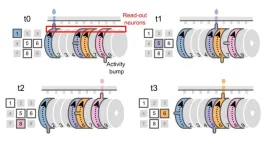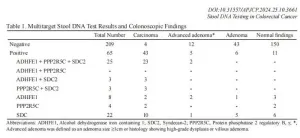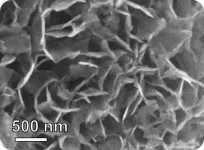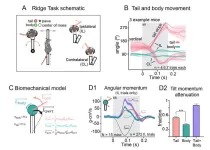(Press-News.org) Ghent, 7 November 2024 – Scientists have uncovered how certain E. coli bacteria in the gut promote colon cancer by binding to intestinal cells and releasing a DNA-damaging toxin. The study, published in Nature, sheds light on a new approach to potentially reduce cancer risk. The study was performed by the teams of Prof. Lars Vereecke (VIB-UGent Center for Inflammation Research) and Prof. Han Remaut (VIB-VUB Center for Structural Biology).
Bacteria and colon cancer
Colon cancer ranks as the third most prevalent and deadliest type of cancer. Alarmingly, its incidence is rising, particularly among young people. Emerging evidence indicates that certain bacteria in the gut microbiota (the collection of primarily healthy bacteria in our intestines) can promote the development of colon cancer, through largely unknown mechanisms.
One of the suspected cancer-promoting bacteria is pks+ E. coli, which produces a genotoxin called ‘colibactin’. Colibactin is capable of binding and damaging human DNA, causing mutations that can increase the risk of cancer. These bacteria and the mutations they induce are remarkably overabundant in patients with colon cancer.
Until now, it was unclear how pks+ E. coli could reach and damage the gut wall to promote cancer development. The experiments by the teams of Prof. Lars Vereecke (VIB-UGent) and Prof. Han Remaut (VIB-VUB) revealed that these bacteria switch between a free-swimming state and a mode where they attach to the gut tissue lining (the intestinal epithelium). This attachment is made possible by specific bacterial pili, long thin protein fibers on the bacterial surface that end in adhesins that can bind receptors on the cells of the intestinal epithelium.
“We found that this pilus binding significantly increases the number, size, and aggressiveness of colon tumors,” says Maude Jans (VIB-UGent), first author of the study.
“Our experiments reveal that the binding of pks+ E. coli to the intestinal epithelium can be regarded as a critical step in the development of colon cancer,” says Prof. Lars Vereecke (VIB-UGent), senior author of the study. “We found that by interfering with these bacterial attachment mechanisms, tumor development could be strongly attenuated”.
The proof is in the binding
“We were able to identify the specific bacterial adhesins that mediate binding to colon cells: FimH and FmlH,” says Dr. Magdalena Kolata (VIB-VUB), co-first author of the study. “We hypothesized that the binding by these adhesins allows bacteria to produce the genotoxin colibactin nearby epithelial cells, which leads to DNA damage and cancer development.”
Sure enough, the team demonstrated that the removal of the adhesins takes away the ability of the bacteria to deliver colibactin and cause DNA damage.
“Based on our discoveries, we tested a therapeutic approach to prevent bacterial attachment using molecules that block the binding of these essential bacterial adhesins. Remarkably, we could drastically suppress DNA damage and tumor development in preclinical models”, says Jans. “This therapy approach is very promising since it successfully targets harmful E. coli strains, without affecting beneficial gut microbes, unlike antibiotics.”
The researchers also highlight that a Western lifestyle can make our intestinal wall more accessible to harmful bacteria, including pks+ E. coli.
The new results also shed a precautionary light on a prevailing mystery in the field: some E. coli strains that are approved and used as probiotics (live bacteria thought to promote health) carry the pks genes but do not result in increased cancer risk in laboratory experiments.
“We show that such strains do indeed make colibactin and that they express the FimH and FmlH adhesins used by the pathogenic strains to deliver the toxin to the epithelial cells,” says co-senior author Prof. Han Remaut (VIB-VUB). “It turns out these strains hold a FimH variant that is not very good in binding so that the colibactin toxin does not reach its target”.
However, the authors demonstrate that just a few mutations suffice to restore strong FimH binding and the genotoxic activity of these strains, highlighting that their consideration as benign probiotics may need to be reconsidered.
END
Scientists discover how specific E. coli bacteria drive colon cancer
Certain E. coli bacteria in the gut promote colon cancer by binding to intestinal cells and releasing a DNA-damaging toxin
2024-11-06
ELSE PRESS RELEASES FROM THIS DATE:
Brain acts like music box playing different behaviours
2024-11-06
Neuroscientists have discovered brain cells that form multiple coordinate systems to tell us “where we are” in a sequence of behaviours. These cells can play out different sequences of actions, just like a music box can be configured to play different sequences of tones. The findings help us understand the algorithms used by the brain to flexibly generate complex behaviours, such as planning and reasoning, and might be useful in understanding how such processes go wrong in psychiatric ...
Study reveals how cancer immunotherapy may cause heart inflammation in some patients
2024-11-06
Some patients being treated with immune checkpoint inhibitors, a type of cancer immunotherapy, develop a dangerous form of heart inflammation called myocarditis. Researchers led by physicians and scientists at the Broad Institute of MIT and Harvard and Massachusetts General Hospital (MGH), a founding member of the Mass General Brigham healthcare system, have now uncovered the immune basis of this inflammation. The team identified changes in specific types of immune and stromal cells in the heart that underlie myocarditis and pinpointed factors in the blood that may indicate ...
More families purchased school meals after federal nutrition policies enacted
2024-11-06
Families purchased more school lunches and breakfasts the year after the federal government toughened nutritional standards for school meals. A new University of California, Davis, study suggests that families turned to school lunches after the Obama administration initiative was in effect to save time and money and take advantage of more nutritious options.
Researchers looked at the purchasing habits of nearly 8,000 U.S. households over two years — one year before and after the change in standards. The results have important implications for policymakers and researchers, but also food manufacturers and retailers, researchers said.
The study, ...
Research proves stool DNA as non-invasive alternative for colorectal cancer screening in Thailand
2024-11-06
A recent prospective cross-sectional study in Thailand demonstrates that multitarget stool DNA testing is highly sensitive and specific for detecting colorectal cancer (CRC) among Thai individuals. Researchers believe that this testing method could serve as a viable non-invasive alternative to colonoscopy, especially in settings where colonoscopy is less accessible or less accepted by patients.
This study was conducted by BGI Genomics in 2023, in collaboration with Professor Varut Lohsiriwat’s team from the Faculty of Medicine, Siriraj Hospital, Mahidol University, Thailand. ...
Detecting evidence of lung cancer in exhaled breath
2024-11-06
Exhaled breath contains chemical clues to what’s going on inside the body, including diseases like lung cancer. And devising ways to sense these compounds could help doctors provide early diagnoses — and improve patients’ prospects. In a study in ACS Sensors, researchers report developing ultrasensitive, nanoscale sensors that in small-scale tests distinguished a key change in the chemistry of the breath of people with lung cancer. November is Lung Cancer Awareness Month.
People breathe out many gases, such as water vapor and carbon dioxide, as well as other airborne compounds. Researchers ...
A joint research team of Korea University College of Medicine announced the world's first single-port robotic thymectomy comparative results
2024-11-06
A Joint research team (Prof. Jun-hee Lee, Hyun-koo Kim, Jin-Wook Hwang, Jae-Ho Chung, the Department of Thoracic and Cardiovascular Surgery, Korea University College of Medicine) Announced the world's first compartive results of single-port robotic thymectomy using the single-port robotic system.
The team compared and analyzed the perioperative outcomes of 110 cases of robotic thymectomy using the single-port robotic system and conventional video-assisted thoracic surgery(VATS) thymectomy from November 2018 to May 2024. The results showed that all robotic thymectomy performed were successfully ...
National Mental Health Institute awards CAD 45 million to develop mental health treatments
2024-11-06
One out of 100 people will experience a psychotic episode in their lifetime, and these usually appear in late adolescence or early adulthood. A Canada-US team consisting of Sylvain Bouix, from École de technologie supérieure (ÉTS), Martha E. Shenton and Ofer Pasternak, from the Brigham and Women’s Hospital (Harvard University), and René Kahn, from Mount Sinai Hospital (New York) has just received US $33 million in funding—the equivalent of CAD 45 million—over five years from the National Institute of Mental Health ...
Washington coast avian flu outbreak devastated Caspian terns, jumped to seals
2024-11-06
PULLMAN, Wash. – An epidemiological study found that 56% of a large breeding colony of Caspian terns died from a 2023 outbreak of highly pathogenic avian influenza at Rat Island in Washington state. Since then, no birds have successfully bred on the island, raising concerns that the outbreak may have had a significant impact on an already declining Pacific-coast population.
As part of the study, a team including Washington Department of Fish and Wildlife (WDFW) as well as Washington State University researchers also documented that the avian flu virus H5N1was transmitted to harbor seals for the first time in the northeastern ...
Mice tails whip up new insights into balance and neurodegenerative disease research
2024-11-06
Why do mice have tails?
The answer to this is not as simple as you might think. New research from the Okinawa Institute of Science and Technology (OIST) has shown that there’s more to the humble mouse tail than previously assumed. Using a novel experimental setup involving a tilting platform, high-speed videography and mathematical modelling, scientists have demonstrated how mice swing their tails like a whip to maintain balance – and these findings can help us better understand balance issues in humans, paving the way for spotting and treating neurodegenerative diseases like multiple ...
New study: Earthquake prediction techniques lend quick insight into strength, reliability of materials
2024-11-06
CHAMPAIGN, Ill. — Materials scientists can now use insight from a very common mineral and well-established earthquake and avalanche statistics to quantify how hostile environmental interactions may impact the degradation and failure of materials used for advanced solar panels, geological carbon sequestration and infrastructure such as buildings, roads and bridges.
The new study, led by the University of Illinois Urbana-Champaign in collaboration with Sandia National Laboratories and Bucknell University, shows that the amount ...
LAST 30 PRESS RELEASES:
Scientists show how to predict world’s deadly scorpion hotspots
ASU researchers to lead AAAS panel on water insecurity in the United States
ASU professor Anne Stone to present at AAAS Conference in Phoenix on ancient origins of modern disease
Proposals for exploring viruses and skin as the next experimental quantum frontiers share US$30,000 science award
ASU researchers showcase scalable tech solutions for older adults living alone with cognitive decline at AAAS 2026
Scientists identify smooth regional trends in fruit fly survival strategies
Antipathy toward snakes? Your parents likely talked you into that at an early age
Sylvester Cancer Tip Sheet for Feb. 2026
Online exposure to medical misinformation concentrated among older adults
Telehealth improves access to genetic services for adult survivors of childhood cancers
Outdated mortality benchmarks risk missing early signs of famine and delay recognizing mass starvation
Newly discovered bacterium converts carbon dioxide into chemicals using electricity
Flipping and reversing mini-proteins could improve disease treatment
Scientists reveal major hidden source of atmospheric nitrogen pollution in fragile lake basin
Biochar emerges as a powerful tool for soil carbon neutrality and climate mitigation
Tiny cell messengers show big promise for safer protein and gene delivery
AMS releases statement regarding the decision to rescind EPA’s 2009 Endangerment Finding
Parents’ alcohol and drug use influences their children’s consumption, research shows
Modular assembly of chiral nitrogen-bridged rings achieved by palladium-catalyzed diastereoselective and enantioselective cascade cyclization reactions
Promoting civic engagement
AMS Science Preview: Hurricane slowdown, school snow days
Deforestation in the Amazon raises the surface temperature by 3 °C during the dry season
Model more accurately maps the impact of frost on corn crops
How did humans develop sharp vision? Lab-grown retinas show likely answer
Sour grapes? Taste, experience of sour foods depends on individual consumer
At AAAS, professor Krystal Tsosie argues the future of science must be Indigenous-led
From the lab to the living room: Decoding Parkinson’s patients movements in the real world
Research advances in porous materials, as highlighted in the 2025 Nobel Prize in Chemistry
Sally C. Morton, executive vice president of ASU Knowledge Enterprise, presents a bold and practical framework for moving research from discovery to real-world impact
Biochemical parameters in patients with diabetic nephropathy versus individuals with diabetes alone, non-diabetic nephropathy, and healthy controls
[Press-News.org] Scientists discover how specific E. coli bacteria drive colon cancerCertain E. coli bacteria in the gut promote colon cancer by binding to intestinal cells and releasing a DNA-damaging toxin







